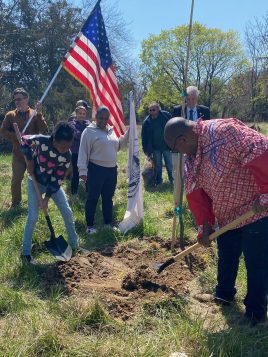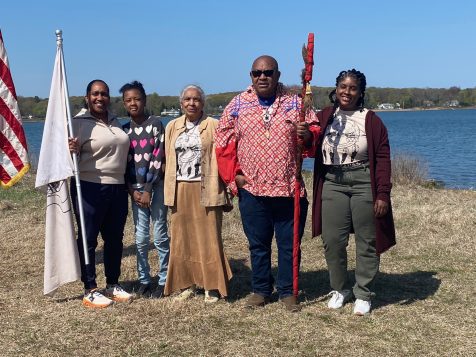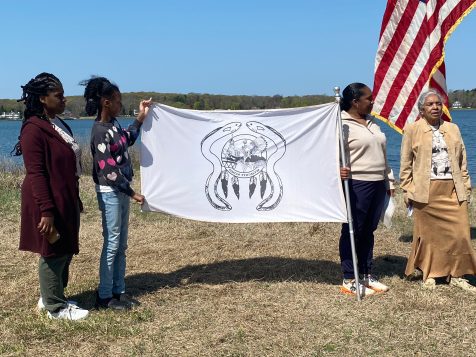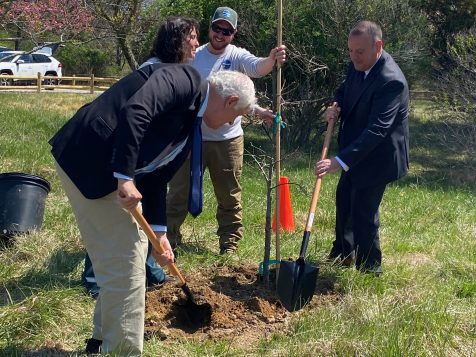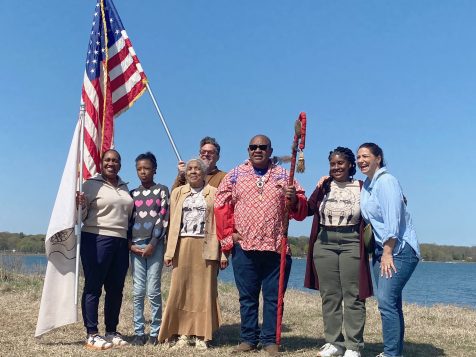Conscience Bay watershed site opens with Setalcott Nation as stewards
By William Stieglitz
The New York Department of Environmental Conservation joined local officials, environmental leaders and the Setalcott Indian Nation April 24 to celebrate the opening of the newly improved Conscience Bay-Little Bay Tidal Wetland Area. In honor of Arbor Day, native trees and bushes were planted for the long-awaited event.
The DEC effort to purchase the Conscience Bay land started in 2008, when a privately owned property came up for sale. The land the DEC already owned there was mostly underwater, but the acquisition created the opportunity for parking space. Closing the deal took until 2015. Then over the following decade the DEC acquired six more properties spanning 15 more acres. This allowed for the demolition of vacated houses to expand the view as well as the removal of septic systems and underground oil storage that endangered the water.
“There was a choice to be made,” said Adrienne Esposito, executive director for Citizens Campaign for the Environment. “You could either see the beautiful area you see here today, or we could have had a condo complex, or a couple of very large mega-mansions. But instead, there was a collaboration… to make sure that this little spot here on Long Island would serve to be preserved, literally, for generations and generations.”
Collaboration was a major theme through the varied speeches, with great emphasis placed on the partnership between Town of Brookhaven and Suffolk County officials with such groups as the Peconic Land Trust, Three Village and Strong’s Neck civic associations and the indigenous Setalcott Nation, who will be stewarding the land and from whom Setauket’s name originates.
The history was a major theme too, in terms of both heritage and geography. “To understand the antiquity of this habitat, you have to go back about 10 to 12 thousand years,” said Suffolk County Legislator Steve Englebright (D, Setauket), explaining how, before Old Field Beach existed, large waves deposited the high-energy environment of the now-still bay. “To have preserved this ancient habitat with interdune swales of freshwater wetlands and dunes is really quite extraordinary.”
The heritage, of course, was especially personal to the Setalcott Nation. “I’m pleased and beyond words, I don’t know where to begin,” said Helen “Hart of Morning Star” Sells, co-chair of the Setalcott Nation. “I’m so happy that this land has been returned home.” She explained how as a girl she and her mom would play at that very shore and how they knew nearly everyone who lived in Strongs Neck. Sells recited a native prayer before the crowd, which emphasized appreciation for “the magnificent creation of mother earth” and “respect for all people.”
Her co-chair, Robert “Silver Wolf” Thompson, also spoke, along with Setalcott Youth Committee Chairperson A’riel “Thundering Sparrow” Hart. “We are hoping,” she said, “this is not the only time we get together and preserve our land. And this day, hopefully, is the beginning, and not the end, of this beautiful moment.”
Following the speeches, all organizers and representatives worked together in 60-degree heat to plant trees for the new site while hawks flew overhead, an animal which Sells highlighted as a sign of good luck and blessing for the Setalcott Nation. The planted species included 10-year-old black oak and red maple saplings, along with two-year-old white cedar saplings. Each is native to the area and had been grown at a local nursery.
In terms of next steps, DEC Acting Commissioner Amanada Lefton hopes proposed changes in the state budget, backed by Governor Kathy Hochul (D), will allow for improved efficiency in the land acquisition program. As for the Setalcott Nation, they will be kelp farming at the Setauket Harbor by Poquott, a practice that helps reduce nitrogen pollution in our waters and produces kelp that can be combined with soil for gardening.
Sells also said she hopes the Conscience Bay victory will be a step forward in one day achieving state and federal recognition for the Setalcott Nation, who are considered a nonreservation. “When we first started out… 20, 30 years ago… we understood there were steps that we had to do. So we’re climbing the ladder.”
For more information visit the DEC website: dec.ny.gov.

